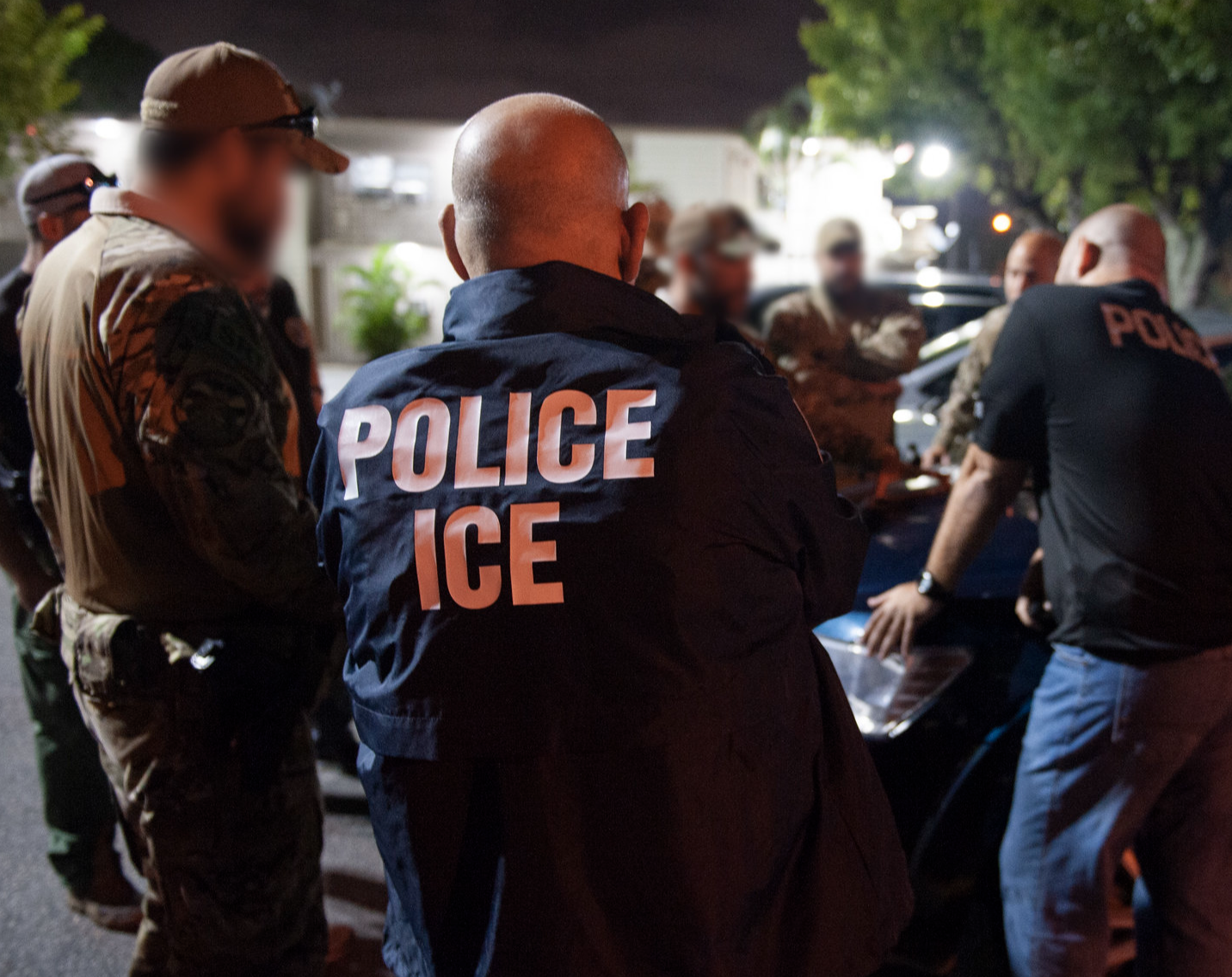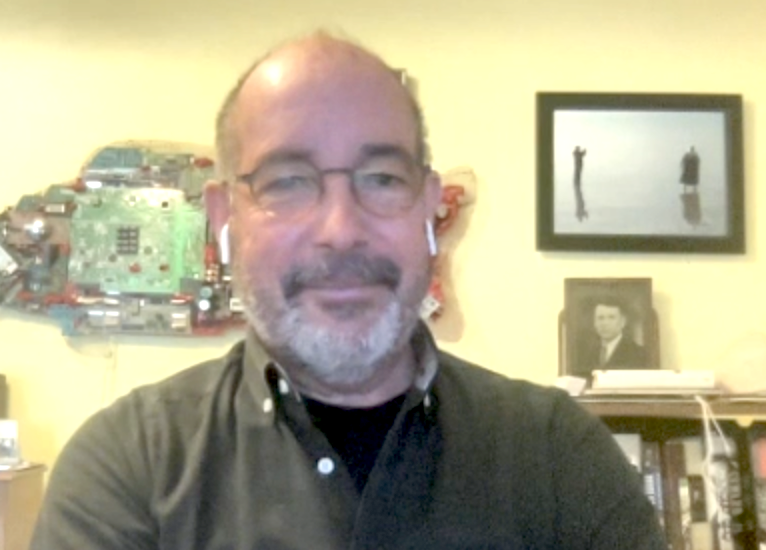John G. Perren, FBI special agent in charge of counter-terrorism at the Washington field office, spent a half year in Iraq for the bureau in 2005 as the on-scene commander before returning home to headquarters to become section chief of the Weapons of Mass Destruction/Domestic Terrorism Operations Section. Earlier this year, he took his new post. He recently sat down in his office with ticklethewire .com editor Allan Lengel. The following is a condensed version.
.com editor Allan Lengel. The following is a condensed version.
Q. You think about of all the white supremacist groups and now we have a black presidential candidate. Has that changed the landscape at all with Obama running?
A. We have a domestic terrorism squad that we task their sources to be our ears on the ground in case any kind of threat does come up against a candidate. If you you listen to the rhetoric and beliefs, this plays into their fears.
The rhetoric has picked up. You can see that in open source reporting. Go on the Internet, we’re getting source reporting that they’re very keenly aware and watching very closely, politics, what’s going on. Any information on any threats we get regarding presidential candidates, we coordinate closely with U.S. Secret Service.
Q. Since Sept. 11, the Internet has become more and more a part of our culture. How has that impacted the terrorism network and has that impacted the way you investigate it?
A. What its done, its taken this large world of ours and made it a lot smaller. It enabled these Jihadist, these terrorist groups to actually match recipes over the Internet, talk to each other over the Internet, conduct training over the Internet. What we’ve done in the Washington field office, we’ve started a terrorist cyber squad to address such threats.
Q. How does that work?
A. Right now, I don’t want to comment too much on that. We’ll be conducting investigations over the Internet. It won’t just be for this area. The Internet squad will be starting out in Manassas. This will be national and worldwide. We’re talking about getting set up in the next couple months. We’re aware of the cyber threat.
Q. We’ve heard a lot about sleeper cells since Sept. 11. Are there sleeper cells?
A. That’s always a concern for us. Our biggest concern… that lone wolf. That’s still our concern. Home grown people. We not only have core al Qaeda and we have al Qaeda inspired and we have those that sit there and listen and absorb it and sympathize, and those are the people that run below the radar that we’re really concerned about. That runs across international terrorism, domestic terrorism, WMD threats. The lone wolf is what worries us the most.
Q. Back to domestic terrorism…
A. After the Oklahoma bombing, they became more prominent.
I think they were always there but they came to the forefront. We still have our right wing groups, we still have our left wing groups, we still have our special interest groups, they’re not as vocal, they don’t seem as organized as they used to be with the passing with National Alliance leader (white supremacist group). They kind of split off in different factions. They’re still out there. Again you go back to that lone wolf. That’s my biggest concern. The lone wolf that joins a group and is not satisfied with the radicalism of that group, and thinks they’re all talk; looks for a more radical group and doesn’t find one and decides to do something himself. That’s the guy that’s flying under the radar. That’s why we need to have all the ears and eyes on the ground watching for somebody like that. That’s why we set up what we call trip wires. That’s why we go to talk to the Home Depots, the Loews. And to the chemical folks. If somebody does come and starts purchasing a lot of ammonia nitrate, a lot of fertizler or goes to chemical companies or storages and purchases a lot of precursors like hydrogen peroxide, things like that. We have these alarm bells on there so they’ll pick up the phone and ‘go yeah, we just sold, don’t know why he bought all these stuff.’ That’s what we constantly do. Make folks aware. We set up our trip wires.
Q. After Sept. 11 you were inundated with tips. Have you learned to sift through that better so you’re not spending as much time chasing after the wrong people?
A. We still have that ‘no lead is left unaddressed’. Anything we get we chase it down. In the Washington field office, we have a Guardian Squad that does that. Any threat, any information, suspicious activity, anything we get, we generate a lead and follow it up.
Q. Before Sept. 11, a lot of people did not know about Middle Eastern culture. What’s the FBI done to close that gap?
A. We have several agents that have received culture training, they’ve gone over to the Middle East and had language training, culture training. Our Intel analysts that are coming into the bureau and our agents that are coming to the bureau, we’re looking for diversified backgrounds and culture. We have given culture training. Here at the Spy Museum, the Joint Terrorism Task Force, our agents, task force officers, we had these folks from West Pointe come in; professors, doctors, that have been in the culture, teach our folks for about a one-week long lesson plan. It had to do with culture. Everything from talking, to gestures, how to approach people, how to conduct interviews and the historical perspective of cultures, Muslims, Islam, how it all comes together. That’s going to be ongoing. That’s not going to be a one time thing.
Q. Have terrorists groups changed the way they do things?
A. We have certain groups out here, they’re here strictly to raise funds. And we follow the money. We know these funds are being used to support terrorists. We’re doing that not just here in the Washington D.C. area, but we’re doing it nationally. I don’t want to get into specifics. We have active investigations where we know folks are raising funds, taking these funds, sending them abroad and they’re used in support of terrorism or used in support of training. Again, it’s following the money.
Q. Back to sleeper cells. There are a lot of sleeper cells?
A. I know in 2006, you know when we went to the caves and all that stuff and came up with the pocket litter. That was part of their plan, send people over and have them be westernized and use these folks. To answer your question, I’m not going to answer that question. We’re aware of that possibility.
Q. Have the data bases been helpful?
A. It has been. As far as information sharing, sharing data, it’s been real helpful. It’s almost unheard of now for an agency not to talk to another agency. A lot of data bases are grouped together so a lot of agencies can data mine them.
Q. Are you still getting good intelligence from overseas, in Iraq?
A. Yes.
Q. Have you been able to work any known plots?
A. (Doesn’t want to discuss).
Q. Is that frustrating (not being able to discuss that)?
A. We have no issue with that. We can take our criticisms, we take our shots, but we know of our accomplishments. We can’t sit there and talk about these accomplishments.
Q. There is a list of what the U.S. considers terrorist organizations. Obviously the magic word there is al Qaeda, the Taliban. What about Hezbollah and Hamas? Do you see them as threats in this country or are they just threats to the respective countries?
A. We’re actively working those organizations; we’re actively working Hamas, we’re actively working Hezbollah. We’ve got a squad dedicated directly to Hamas and Hezbollah. I’ve got to be very careful, we’ve got ongoing investigations. We’ve got activity in our area that we’re investigating. They’re not what we call the bomb throwers, but they’re in support of training, recruiting, sending financing that we’re actively investigating. You have to remember an organization like that we may not have the operators here but the infrastructure is here. So what would it take for them to go from support to operational? That’s something that we’re always thinking about.
Q. There’s been talk since 2001 about the FBI should stick to certain things besides terrorism…
A. I think the FBI is very unique that we can combine our intelligence capabilities with our law enforcement capabilities. That’s our uniqueness. We’ve had MI5 come to the United States, take a look at us and say ‘Man, we wish we could do what you could do. We don’t work as well as you do. Don’t turn into MI5.’
Q. In the hi-tech world, have you been surprised?
A. They’re very savvy. They use the Internet, they know how to set up firewalls, they have their experts they use. That’s what this one squad is going to go after, identify these folks so they can’t communicate with each other, they can’t train, they can’t share information. We want to shutdown the site.
Q. Any advice to agents?
A. What I tell agents now. After they’re probationary time is up I have them come in my office. All new agents, I tell them let us not get complacent. Let us not forget about 9/11. let us keep that sense of urgency. Because nothings happened, let us not let our guard down. That’s my biggest fear that we let our guard down.




